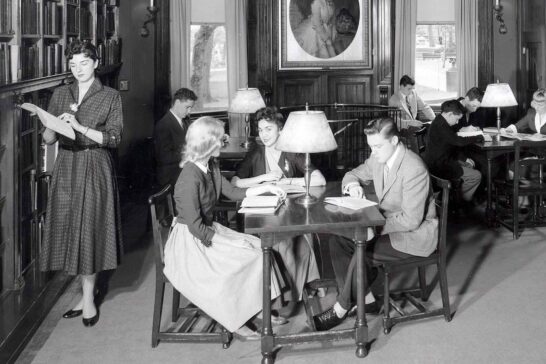You don't play jazz? George Walker makes his own path.

Walker had found his love for the piano at age 5 and by the time he was 15, was given a scholarship to the Oberlin Conservatory. After obtaining his bachelor’s degree at 18, he began his studies at the Curtis Institute of Music with legendary pianist Rudolf Serkin. But Walker often disagreed with Serkin’s approach.
“In his favorite works by Bach, Mozart, Beethoven, and Schubert, his comments were occasionally insightful: especially as regards rhythmic relationships and dynamics. But in Chopin, Liszt, or Rachmaninoff he had practically nothing to say about tone color, rubato, or pedaling.”i
Composing came extremely easily to me
Walker’s frustrations led him to begin composition lessons with Rosario Scalero to better understand music from a theoretical perspective. Instead, he discovered his creativity and talent for counterpoint.
“I discovered that composing came extremely easily to me. I could manipulate musical materials within the rules very quickly and get the maximum result. I especially had a flair for canonic writing. “ii
Despite his interest in composition, his focus remained on his dream of becoming a concert pianist. Walker became the first Black instrumentalist to play in New York Town Hall as well as the first Black pianist to perform as a soloist with the Philadelphia Orchestra.
Maybe we can arrange for you to play Rhapsody in Blue
Though an accomplished performer, Walker often found himself pigeonholed into playing certain repertoire on grounds of his race.
“It’s the first thing that comes to most peoples’ mind. That if you’re in music, you must play jazz. You don’t play jazz? I can’t believe it. It’s a stereotyping that is sort of endemic.”iii
In one instance, after an audition for the Ravinia festival, Walker was told, “Well, maybe we can arrange for you to play Rhapsody in Blue.”iii That was only one aspect of the discrimination he faced: the other being outright exclusion. In 1950, Walker signed with National Concert Artists but was quickly discouraged:
“My contemporaries at Curtis: Eugene Istomin, Gary Graffman were assured of 25 to 30 concerts a season, but I was lucky if I got seven.”iv
He left National Concert Artists after three seasons.
Walker recalled that a turning point in his career was when his father finally told him, “They’re not going to give you what you deserve. You’re going to have to teach.” v He finally decided to focus his energy on composition and began working towards a PhD from the Eastman School of Music. Soon after his graduation, he received a John Hay Whitney and Fulbright scholarship allowing him to study with Nadia Boulanger at the American Academy in Fontainebleau, France. She quickly recognized his talent and excused him from normal student requirements, an arrangement she did not afford other pupils including Aaron Copland and Elliot Carter.v After two years in France, Walker traveled back to the U.S. to begin his career as a pedagogue and built a reputation as a demanding teacher. His teaching career was unfortunately not without discrimination. At Smith College in particular, he found himself fighting for tenure while his white colleagues were granted it automatically. vi
Receiving the Pulitzer Prize
In 1996, Dr. Walker received a Pulitzer Prize for his work, Lilacs for Voice and Orchestra, premiered by the Boston Symphony Orchestra under Seiji Ozawa. The award was bittersweet; on one hand, it represented his perseverance and success despite discrimination. But on the other, it was a sharp reminder of the racial prejudice so prevalent in classical music.
“I got probably more publicity nationwide than perhaps any other Pulitzer Prize-winner. But not a single orchestra approached me about doing the piece or any piece. My publisher didn’t have sense enough to push. It materialized in nothing.”vii
The number of performances of Dr. Walker’s works stands in stark contrast to that of white Pulitzer Prize-winning composers of the same era, whose compositions have essentially been canonized as part of a distinctly American sound.
“I’ve benefited from being a black composer in the sense that when there are symposiums given of music by black composers, I would get performances by orchestras that otherwise would not have done the works. The other aspect, of course, is that if I were not black, I would have had a far wider dispersion of my music and more performances.” vii
Dr. Walker wrote over 90 works during his career. In a 2009 interview, he spoke to NPR of forging his own path.
“I had to find my own way. A way of doing something that was different, something that I would be satisfied with.” viii
The statement epitomizes both his life as a musician and the construction of his music, which is always uncompromisingly his own. However criminally underperformed, his works have shaped the modern American sound and established him as one of the great composers of the 20th century.
As a student, George Walker premiered six works at Curtis recitals, including Prelude, Aria, Toccata, Sonata in E minor for violin and piano, Three Pieces, and String Quartet. Below is the 1945 program which includes Three Pieces.
Dr. Walker returned to Curtis in 1984 to conduct a masterclass for composition students.
In 1997, the Curtis Institute gave Dr. Walker an Honorary Degree in recognition for his accomplishments. To again acknowledge his work and career, he was given the President’s Alumni Award in May of 2018. At age 96, Walker passed in August of the same year.
To view more resources related to Black musicians and composers, see the LibGuide.
Students can access the Curtis 20/21’s 2016 performance of Dr. Walker’s Lyric for Strings performed by the Zorá String Quartet here.
i Plaskin, G. (1982). A Composer Who Backed Into the Business. The New York Times. https://www.nytimes.com/1982/01/10/arts/a-composer-who-backed-into-the-business.html
ii Anonymous, (2014). George Walker Biographical Information. http://georgetwalker.com/bio.html
iii Edgers, G. (2015). In lifes coda, master composer George Walker has a symphony in mind. The Washington Post. https://www.washingtonpost.com/entertainment/music/2015/08/20/d6e9e6c2-3beb-11e5-9c2d-ed991d848c48_story.html
iv Plaskin, G. (1982). A Composer Who Backed Into the Business. The New York Times. https://www.nytimes.com/1982/01/10/arts/a-composer-who-backed-into-the-business.html
v Blumenthal, R. (1996). A Pulitzer Winners Overnight Success of 60 Years. The New York Times. https://www.nytimes.com/1996/04/11/arts/a-pulitzer-winner-s-overnight-success-of-60-years.html
vi Watson, B. (1997). Pulitzer Composer and Bittersweet. Daily Hampshire Gazette.
vii Huzienga, T. (2018). George Walker, Trailblazing American Composer, Dies at 96. NPR. https://www.npr.org/sections/deceptivecadence/2018/08/24/641606061/george-walker-trailblazing-american-composer-dies-at-96
viii Rose, J. (2009). Composer George Walker Writes For His Son. NPR. https://www.npr.org/templates/story/story.php?storyId=121347117
This article includes content originally written by Claire Thai, (Harp, ’22)
These media items are protected under copyright and made available by the Rock Resource Center at the Curtis Institute of Music to all users for educational and research purposes. No further reproduction or distribution is permitted. To obtain rights for reproduction/distribution or if you are a copyright holder and would like to dispute Curtis’s right to distribute, please contact the Curtis Archives.








